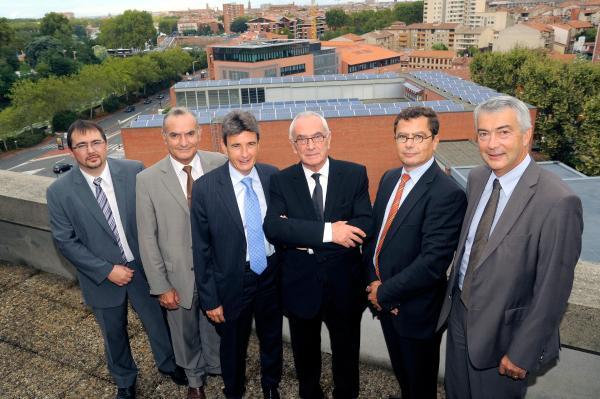
“I am delighted to be in Toulouse today to sign the “Renewable Energy” and “Rail Plan” loans, which will help to make Europe and the region’s ambitions a reality. This financing operation will trigger investment of over EUR 1.5 billion in the Midi-Pyrénées region. What we are launching today is a mini regional and European recovery plan in support of the 2020 vision of a competitive European economy.”
Philippe de Fontaine Vive
Vice-President of the European Investment Bank
Today in Toulouse, the President of the Midi-Pyrénées Region, Martin Malvy, and EIB Vice-President Philippe de Fontaine Vive signed a finance contract worth EUR 300 million aimed at upgrading and developing the region’s rail network.
This agreement forms part of the Midi-Pyrénées Region’s 2008-2013 Rail Plan, the first of this size in France mainly devoted to the regional express network. The Plan was made necessary by the run-down state of the regional network, which resulted in the closure of numerous regional express lines. Its purpose is to provide the region with an upgraded and permanent network of 500 km of lines with the aim of increasing the frequency of services and cutting journey times. The Plan comprises a set of schemes involving track renewal and dualling, reinforcement of engineering structures and the installation of new traffic management systems that are essential to cater for the substantial increase in traffic.
Launched by the Midi-Pyrénées Region, which is contributing EUR 400 million of a total EUR 820 million, the Rail Plan has been signed with SNCF and is being cofinanced by RFF, the French Government and the European Union (ERDF).
The EUR 300 million EIB loan will specifically serve to facilitate traffic between Toulouse and St Sulpice, currently one of the busiest single-track lines in Europe, by refurbishing:
- The track and its components between Empalot and Auch, Figeac and Bagnac, Brive and Capdenac, Capdenac and Rodez, Tessonnières and Capdenac, Portet and Tarascon, Toulouse and St Sulpice, and St Sulpice and Tessonnières;
- The Tessonnières-Rodez, Tarascon-Latour de Carol and St Sulpice-Mazamet sections of line.
EIB Vice-President Philippe de Fontaine Vive welcomed the signing of the loan, saying: “I am very pleased that the EIB is helping the Midi-Pyrénées Region to refurbish and upgrade its rail network. This will have a direct and positive impact on the environment and ultimately foster sustainable mobility in Midi-Pyrénées. Sustainable regional transport is an EU priority and a key element of economic, social and human development that contributes directly to improving the quality of people’s daily lives.”
This loan forms part of the EIB’s ongoing priority actions in the transport field, an integral component of which involves encouraging travellers to switch from road to rail. The aim is to improve traffic flows and road safety, but also to reduce greenhouse gas emissions. Although the EIB still provides loans for building major motorway links, it is increasingly supporting the development of the rail sector through the construction of high-speed train lines, creation of trans-European freight corridors, upgrading of regional networks and modernisation of safety systems. It has lent more than EUR 4.6 billion for French rail projects, including some EUR 3.6 billion for high-speed lines and nearly EUR 900 million over the last ten years alone for the development and modernisation of regional express lines in Brittany, Champagne-Ardenne, Rhône-Alpes, Picardy, Haute-Normandie, the Loire region and Nord/Pas-de-Calais.
Note for editors:
About the EIB
The EIB is the bank of the European Union. Its remit is to provide mainly long-term loans to support viable private or public investment projects that realise the objectives of EU integration, cohesion and development, based on six priority policies: economic and social cohesion; protection of the natural and urban environment; research and innovation; support for SMEs; trans-European transport networks; and the promotion of secure, competitive and sustainable energy supplies. In 2009, it provided finance totalling EUR 70 billion within the European Union, an increase of 36% compared with the EUR 51.7 billion lent in 2008. Also in 2009, to support the economy in the wake of the crisis, it granted loans totalling EUR 79 billion to businesses and local authorities within and outside the European Union.

Photographer: EIB ©To be defined
Download original

Photographer: EIB ©To be defined
Download original